When it comes to healthy snacking or boosting the protein content of your meals, nuts are a wise choice. But if you want to maximize your protein intake, you might wonder which nuts provide the best bang for your nutritional buck. To determine the highest protein nuts, we consulted Destini Moody, RDN, CSSD, LD, a registered dietitian and sports dietitian with Garage Gym Reviews, who shares expert insights on the highest protein nuts and tips for including them as part of a healthy diet.
Nuts are a top-notch source of plant-based protein, vitamins, minerals, and fiber. According to a recent study, incorporating them into your diet provides several benefits, such as increasing satiety and supporting healthy weight management. Additionally, if you’re physically active or working on building lean muscle, nut-based proteins can be a valuable addition to your diet. Research shows these plant proteins can stimulate muscle protein synthesis to help build and repair muscle. Higher nut intake is also associated with better blood sugar control and may help prevent insulin resistance.
Whether you enjoy them as a quick snack, sprinkle them over salads, or use them in cooking and baking, adding these nuts to your weekly menu can boost your protein intake and overall health. Read on to learn more about the six highest protein nuts, according to Moody. And, when you’re done, don’t miss the 9 Best Low-Calorie Breakfasts for Weight Loss.
Peanuts
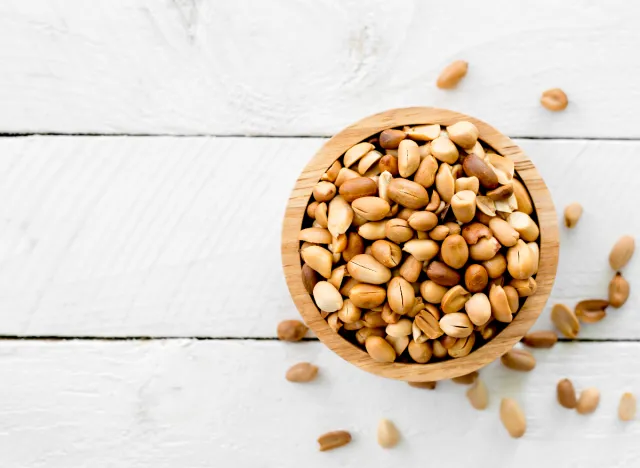

Protein (per ounce): 7 grams
Calories: 161
With about 7 grams of protein and 161 calories per ounce, peanuts are a stellar choice when choosing high-protein nuts to munch on. They’re also highly versatile and can be enjoyed in several ways, including as a peanut butter sandwich, roasted peanuts, or a base for homemade sauces.
“Peanuts contain the highest amount of protein out of any other nut. They’re also a good source of magnesium, which helps regulate blood sugar levels. While nuts can be quite expensive, depending on the type you buy, peanuts are among the more affordable variety,” says Moody.
Almonds


Protein (per ounce): 6 grams
Calories: 164
Almonds contain 6 grams of protein and 164 calories per ounce. According to a 2020 study in Nutrients, almonds are an excellent source of plant protein, healthy fats, fiber, vitamin E, and essential minerals like magnesium. Their versatility allows you to enjoy them as a topping on your breakfast cereal, in yogurt parfaits, or simply as a solo snack.
“Almonds are high in vitamin E, which is an important antioxidant known for helping to clear free radicals and inflammatory compounds from the body,” Moody explains. “They can also help lower cholesterol. Also, they’re lower in fat than many other nuts, which makes them more fitting in a weight loss diet.”
Pistachios
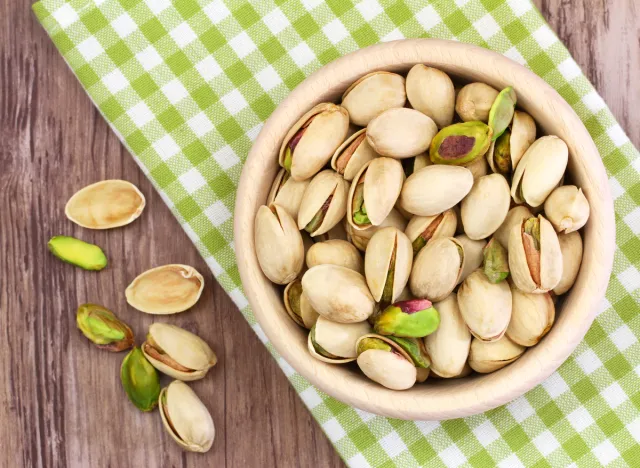

Protein (per ounce): 6 grams
Calories: 159
Pistachios stand out with their vivid green color and satisfyingly crunchy shells. One ounce of pistachios packs roughly 6 grams of protein and 159 calories. They’re also rich sources of fiber, healthy fats, vitamins, minerals, and antioxidants like flavonoids and anthocyanins that make them highly anti-inflammatory.
“The wonderful thing about pistachios is they contain all nine essential amino acids or amino acids the body cannot make on its own and must get from food,” says Moody. “This is a rare quality of plant foods as typically animal protein sources are the most reliable sources of these compounds. Pistachios still contained in the shell can also be useful for weight loss, as it’s more difficult to eat them too quickly when you have to work for the nut inside.”
Cashews
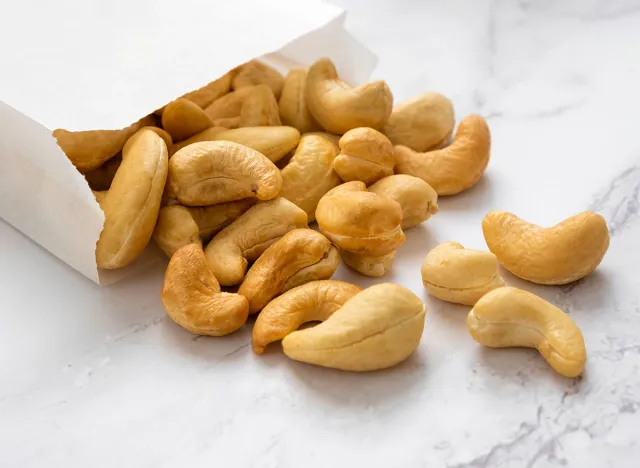

Protein (per ounce): 5 grams
Calories: 157
Besides being delicious, cashews deliver approximately 5 grams of protein and 157 calories per ounce. Their creamy texture and subtly sweet flavor make them a great addition to sweet and savory dishes. Plus, they’re incredibly versatile and can be sprinkled over salads, blended into creamy sauces, or snacked on by the handful.
“Copper, which is abundant in cashews, can help support bone and cardiovascular health,” states Moody. “Cashews also are known as the richer-tasting cousin of the peanut, and science shows that roasted cashews may contain more antioxidants.”
Hazelnuts
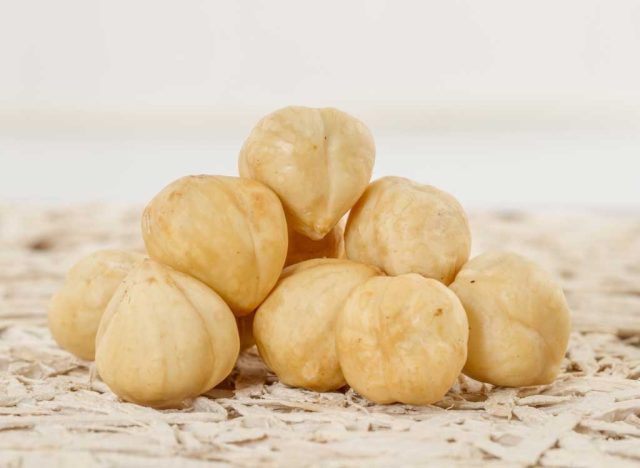

Protein (per ounce): 4 grams
Calories: 178
Hazelnuts contain around 4 grams of protein and 178 calories per ounce. While they’re well known for adding a nice crunch to sweet treats like chocolate spread, hazelnuts are also nutritious. One study suggests that hazelnuts’ high antioxidant content can combat inflammation and reduce oxidative stress.
“Hazelnuts may be more known as a flavoring for coffee or chocolate, but they also have a good amount of protein. Higher in fat than most nuts, they still contain a good ratio of monounsaturated fat that’s been shown to reduce the risk of heart disease,” says Moody.
Walnuts
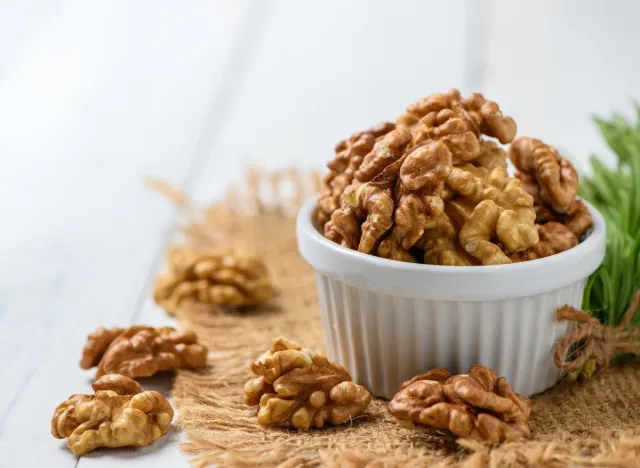

Protein (per ounce): 4 grams
Calories: 180
These brain-shaped nuts are packed with heart-healthy omega-3 fatty acids. One ounce of walnuts provides 4 grams of protein and 180 calories. Their distinct flavor, crunch, and versatility make them a top choice for salads, smoothie bowl toppings, and baking to increase your plant protein intake and boost your heart health.
“Walnuts have among the highest fat content of any other nut,” says Moody. “While it may not be recommended to indulge in walnuts too often if you’re trying to lose weight, it’s important to note that these fats are a special kind of fat called omega-3s. Omega-3s are essential fatty acids that lower heart disease risk and boost brain health.”

